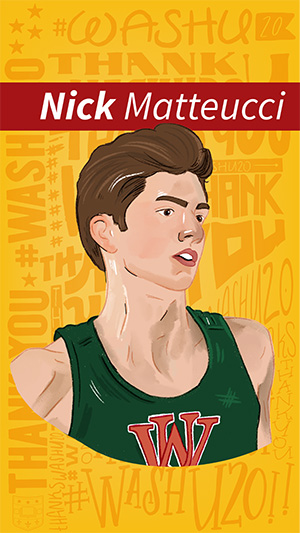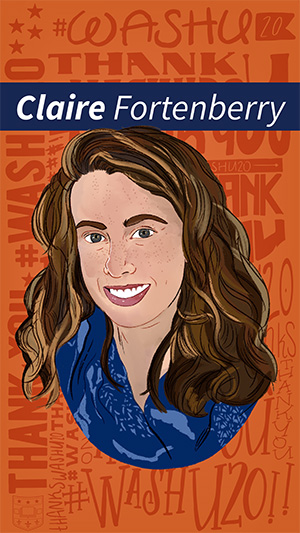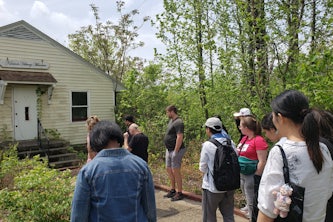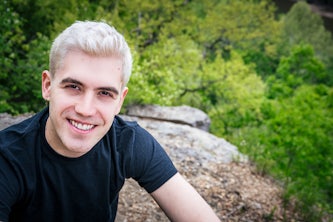Thank You, #WashU20
We wish we could express our gratitude to each one of you; instead, we deliver these postcards of appreciation highlighting students who embody the spirit of your Class of 2020

To the Class of 2020: Thank you. For your commitment to academic excellence. For your service to the St. Louis community. For your support of your fellow students. For your devotion to your labs, your teams, your campus organizations. You made Washington University in St. Louis better. We wish we could express our gratitude to each one of you; instead, we deliver these postcards of appreciation highlighting students who embody the spirit of your Class of 2020.
Postcards of Appreciation
Nick Matteucci

Thank You Nick Matteucci for being a leader on the track and in the locker room.
A nine-time NCAA All-American, Matteucci led Washington University in St. Louis’ cross-country and indoor track teams to their best finishes in Bear history and set a school record in the 1,500-meter run in outdoor track and field.
But for Matteucci, the team matters more than the trophies.
“As a runner, there’s always another race, another personal record to chase,” said Matteucci, who is earning a bachelor’s degree in chemical engineering from the McKelvey School of Engineering and will then pursue a PhD in chemical engineering. “If that’s all that matters, you will never be satisfied. The joy, for me, comes from putting it all out there for my teammates.”
That attitude is what makes Matteucci among the most selfless servant leaders Jeffrey Stiles, head coach of the track-and-field and cross-country teams, said he has had the privilege to coach.
“He loves the team, he hates to lose and his competitive intuition is second only to his academic prowess,” Stiles said. “It’s hard when your senior indoor and outdoor seasons are stripped away, especially since he had the team primed to win the indoor title. But he has shown his teammates that their bonds are what matter.”
Matteucci also is committed to his runners on the Bear Cubs Running Club, which pairs varsity athletes with children on the autism spectrum. One of his runners went on to join his middle school team. Another, who started the program unable to complete a lap around Francis Field without walking, now can run a mile without stopping.
“It is incredible to see their enthusiasm when they set and achieve their goals,” Matteucci said. “To be able to use something I’m really passionate about — running — to help others is the best thing.”
Claire Fortenberry

Thank you Claire Fortenberry for doing your part to improve the air we breathe.
Fortenberry is set to graduate with a PhD in energy, environmental & chemical engineering from the McKelvey School of Engineering. For six years, she has worked in Brent Williams’ Atmospheric Chemistry and Technology Lab, where she has built equipment to measure indoor and outdoor air quality.
Williams is the Raymond R. Tucker Distinguished InCEES Career Development Associate Professor.
“Equipment can be expensive and difficult to transport to places where it matters most,” Fortenberry said. “We’ve managed to build an instrument that measures a wider variety of pollutants and we’ve used it to gain a better understanding of different particles and gases in the air we breathe. It’s been challenging — instrument development is hard, things break. But there is nothing more empowering than taking something that’s broken and making it work.”
Growing up in Virginia, Fortenberry wanted to save lives. Medicine seemed the obvious choice, but she realized her skills in physics and chemistry would allow her to tackle one of the globe’s biggest threats to human health: pollution. According to the World Health Organization, some 7 million people die prematurely due to indoor and outdoor air pollution.
“It blows my mind how much air quality makes a difference in people’s lives,” Fortenberry said. “We mostly understand the impact of outdoor air pollution, but indoor pollutants also impact our health in ways that aren’t easy to predict. The time of day you cook, what cleaning supplies you use, even an open window — all of these can detract from your indoor air quality.”
After graduation, Fortenberry plans to begin work at the NASA Glenn Research Center in Cleveland, where she will study a different type of atmosphere: space. NASA has charged her with improving fire safety on the International Space Station by researching how smoke particles are formed and move in a microgravity environment. Fortenberry is up to the task.
“I can’t believe how much I’ve learned here,” Fortenberry said. “I have my colleagues and adviser to thank for that. But this work required me to teach myself things I had no idea I would be doing.”



